-
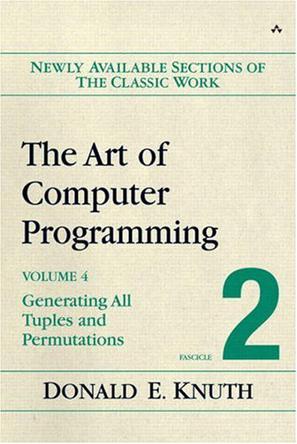
The Art of Computer Programming, Volume 4, Fascicle 2
From the Back Cover This multivolume work on the analysis of algorithms has long been recognized as the definitive description of classical computer science. The three complete volumes published to date already comprise a unique and invaluable resource in programming theory and practice. Countless readers have spoken about the profound personal influence of Knuth's writings. Scientists have marveled at the beauty and elegance of his analysis, while practicing programmers have successfully applied his "cookbook" solutions to their day-to-day problems. All have admired Knuth for the breadth, clarity, accuracy, and good humor found in his books. To begin the fourth and later volumes of the set, and to update parts of the existing three, Knuth has created a series of small books called fascicles, which will be published t regular intervals. Each fascicle will encompass a section or more of wholly new or evised material. Ultimately, the content of these fascicles will be rolled up into the comprehensive, final versions of each volume, and the enormous undertaking that began in 1962 will be complete. Volume 4, Fascicle 2 This fascicle inaugurates the eagerly awaited publication of Knuth's The Art of Computer Programming, Volume 4: Combinatorial Algorithms. Part of what will be a long chapter on combinatorial searching, the fascicle begins his treatment of how to generate all possibilities. Specifically, it discusses the generation of all n-tuples, then extends those ideas to all permutations. Such algorithms provide a natural motivation by means of which many of the key ideas of combinatorial mathematics can be introduced and explored. In this and other fascicles of Volume 4, Knuth illuminates important theories by discussing related games and puzzles. Even serious programming can be fun. -
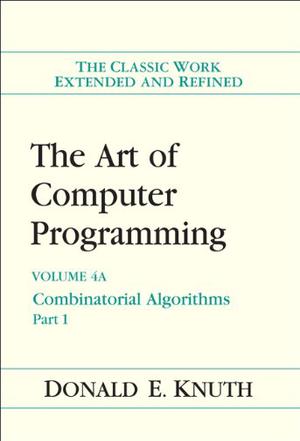
The Art of Computer Programming, Volume 4A
The book is Volume 4A, because Volume 4 has itself become a multivolume undertaking. Combinatorial searching is a rich and important topic, and Knuth has too much to say about it that is new, interesting, and useful to fit into a single volume, or two, or maybe even three. This book alone includes approximately 1500 exercises, with answers for self-study, plus hundreds of useful facts that cannot be found in any other publication. Volume 4A surely belongs beside the first three volumes of this classic work in every serious programmer’s library. -
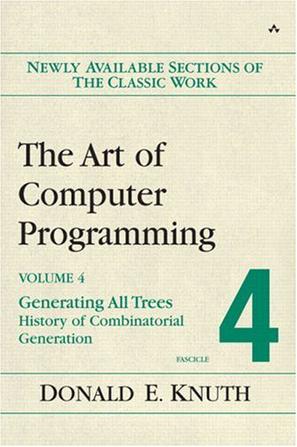
The Art of Computer Programming, Fascicle 4
Finally, after a wait of more than thirty-five years, the first part of Volume 4 is at last ready for publication. Check out the boxed set that brings together Volumes 1 - 4A in one elegant case, and offers the purchaser a $50 discount off the price of buying the four volumes individually. The Art of Computer Programming, Volumes 1-4A Boxed Set, 3/e ISBN: 0321751043 Art of Computer Programming, Volume 4, Fascicle 4,The: Generating All Trees--History of Combinatorial Generation: Generating All Trees--History of Combinatorial Generation This multivolume work on the analysis of algorithms has long been recognized as the definitive description of classical computer science.The three complete volumes published to date already comprise a unique and invaluable resource in programming theory and practice. Countless readers have spoken about the profound personal influence of Knuth's writings. Scientists have marveled at the beauty and elegance of his analysis, while practicing programmers have successfully applied his “cookbook” solutions to their day-to-day problems. All have admired Knuth for the breadth, clarity, accuracy, and good humor found in his books. To begin the fourth and later volumes of the set, and to update parts of the existing three, Knuth has created a series of small books called fascicles, which will be published at regular intervals. Each fascicle will encompass a section or more of wholly new or revised material. Ultimately, the content of these fascicles will be rolled up into the comprehensive, final versions of each volume, and the enormous undertaking that began in 1962 will be complete. Volume 4, Fascicle 4 This latest fascicle covers the generation of all trees, a basic topic that has surprisingly rich ties to the first three volumes of The Art of Computer Programming. In thoroughly discussing this well-known subject, while providing 124 new exercises, Knuth continues to build a firm foundation for programming. To that same end, this fascicle also covers the history of combinatorial generation. Spanning many centuries, across many parts of the world, Knuth tells a fascinating story of interest and relevance to every artful programmer, much of it never before told. The story even includes a touch of suspense: two problems that no one has yet been able to solve. -
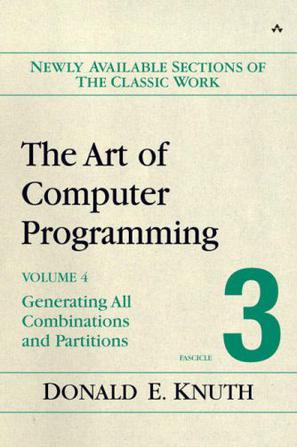
The Art of Computer Programming, Volume 4, Fascicle 3
Finally, after a wait of more than thirty-five years, the first part of Volume 4 is at last ready for publication. Check out the boxed set that brings together Volumes 1 - 4A in one elegant case, and offers the purchaser a $50 discount off the price of buying the four volumes individually. The Art of Computer Programming, Volumes 1-4A Boxed Set, 3/e ISBN: 0321751043 Art of Computer Programming, Volume 4, Fascicle 3, The: Generating All Combinations and Partitions: Generating All Combinations and Partitions This multivolume work on the analysis of algorithms has long been recognized as the definitive description of classical computer science.The three complete volumes published to date already comprise a unique and invaluable resource in programming theory and practice. Countless readers have spoken about the profound personal influence of Knuth's writings. Scientists have marveled at the beauty and elegance of his analysis, while practicing programmers have successfully applied his "cookbook" solutions to their day-to-day problems. All have admired Knuth for the breadth, clarity, accuracy, and good humor found in his books. To begin the fourth and later volumes of the set, and to update parts of the existing three, Knuth has created a series of small books called fascicles, which will be published at regular intervals. Each fascicle will encompass a section or more of wholly new or revised material. Ultimately, the content of these fascicles will be rolled up into the comprehensive, final versions of each volume, and the enormous undertaking that began in 1962 will be complete. Volume 4, Fascicle 3 This fascicle continues Knuth's authoritative chapter on combinatorial algorithms, ultimately to be included in Volume 4 of The Art of Computer Programming. The previous fascicle from Volume 4, which covered the generation of all tuples and permutations, is now complemented by techniques for generating all combinations and partitions. In Knuth's thorough discussion of these two topics, readers will find much that is new, as well as surprisingly rich ties to material in Volumes 1 through 3 and to other aspects of computer science and mathematics. As usual, this fascicle includes a bounty of creative exercises, as well as intriguing challenges posed by yet-unsolved questions. -
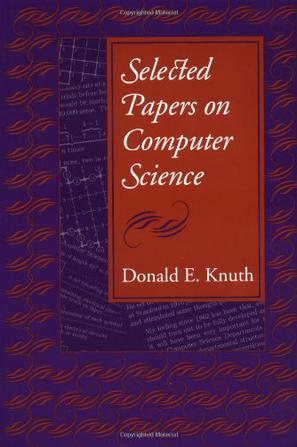
Selected Papers on Computer Science (Center for the Study of Language and Information - Lecture Notes)
-
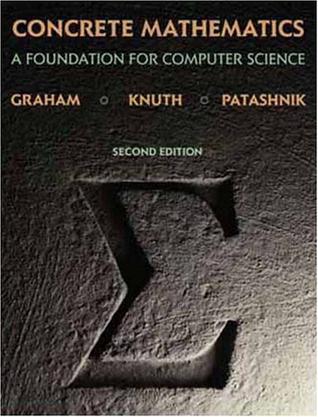
Concrete Mathematics
This book introduces the mathematics that supports advanced computer programming and the analysis of algorithms. The primary aim of its well-known authors is to provide a solid and relevant base of mathematical skills - the skills needed to solve complex problems, to evaluate horrendous sums, and to discover subtle patterns in data. It is an indispensable text and reference not only for computer scientists - the authors themselves rely heavily on it! - but for serious users of mathematics in virtually every discipline. Concrete Mathematics is a blending of CONtinuous and disCRETE mathematics. "More concretely," the authors explain, "it is the controlled manipulation of mathematical formulas, using a collection of techniques for solving problems." The subject matter is primarily an expansion of the Mathematical Preliminaries section in Knuth's classic Art of Computer Programming, but the style of presentation is more leisurely, and individual topics are covered more deeply. Several new topics have been added, and the most significant ideas have been traced to their historical roots. The book includes more than 500 exercises, divided into six categories.Complete answers are provided for all exercises, except research problems, making the book particularly valuable for self-study. Major topics include: *Sums *Recurrences *Integer functions *Elementary number theory *Binomial coefficients *Generating functions *Discrete probability *Asymptotic methods This second edition includes important new material about mechanical summation. In response to the widespread use of the first edition as a reference book, the bibliography and index have also been expanded, and additional nontrivial improvements can be found on almost every page. Readers will appreciate the informal style of Concrete Mathematics. Particularly enjoyable are the marginal graffiti contributed by students who have taken courses based on this material. The authors want to convey not only the importance of the techniques presented, but some of the fun in learning and using them. 0201558025B04062001